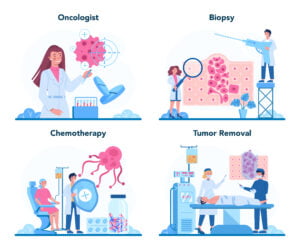Clinical trials are crucial in the ceaseless endeavor to develop novel and efficacious cancer treatments. These trials function as experimental environments for innovative therapies, exerting influence on the trajectory of cancer treatment in the future. This blog post will examine the significance of clinical trials in the realm of cancer research, specifically focusing on their contribution to the development of treatment options and the enhancement of patient outcomes.

A Comprehension of Clinical Trials
Clinical trials are scientific investigations that encompass human subjects in order to assess the efficacy and safety of novel medical interventions, treatments, or procedures. These clinical trials seek to identify and enhance novel methodologies for the diagnosis, prevention, and treatment of cancer. Phases comprise clinical trials, with each phase addressing a distinct set of inquiries pertaining to the treatment under investigation.
Phase I, Safety Assessment: Preliminary investigations evaluate the safety profile of an emerging therapeutic intervention, including the identification of potential adverse effects and the determination of the optimal dosage. The trials generally comprise a limited number of participants.
Efficacy Assessment in Phase II Trials: Following the demonstration of safety in phase I, phase II trials evaluate the treatment’s effectiveness on a more extensive cohort of participants. During this stage, researchers obtain insights into the efficacy of the treatment in combating a particular strain of cancer.

Comparative effectiveness in Phase III: Phase III trials through the comparison of the new treatment with placebo or conventional treatments. These trials encompass a more substantial cohort of participants and furnish vital data pertaining to the efficacy and safety of the novel therapeutic intervention.
Phase IV, post-marketing surveillance: It involves conducting trials on a larger population to assess the long-term safety and efficacy of a treatment subsequent to its regulatory approval.
Developments in Immunotherapy and Targeted Therapies
Clinical trials have played a pivotal role in the advancement of immunotherapy and targeted therapies, two groundbreaking methodologies in the realm of cancer treatment.

Targeted Therapies: In contrast to conventional chemotherapy, which targets healthy cells alongside cancer cells, targeted therapies are engineered to selectively target malignant cells while minimizing adverse effects on healthy cells. The development of pharmaceuticals that inhibit the activity of particular molecular targets on cancer cells has been significantly advanced by clinical trials, resulting in treatments that are more efficacious and comparatively low in toxicity.
Immunotherapy: By utilizing the immune system, immunotherapy targets and destroys cancer cells. In the development of immunotherapies such as checkpoint inhibitors and CAR-T cell therapy, clinical trials have been indispensable. These therapeutic interventions have demonstrated exceptional efficacy in treating a wide range of cancer types, providing renewed optimism for patients who may exhibit unfavorable responses to conventional therapies.
Personalized Care and Precision Medicine
The advent of clinical trials has initiated the era of precision medicine, in which therapeutic interventions are customized to the unique attributes of a patient’s cancer and their genetic composition. Through clinical trials that identify molecular markers and genetic mutations, researchers are able to match patients with therapies that are most likely to be efficacious in relation to their specific cancer profile.
Overcoming Resistance to Treatment:

An additional objective of clinical trials is to comprehend and surmount treatment resistance, which constitutes a substantial obstacle in the field of cancer treatment. Scholars examine the mechanisms by which specific malignancies acquire resistance to particular treatments and devise methods to improve the efficacy of such interventions. This ongoing investigation is of the utmost importance in guaranteeing that patients are provided with efficacious therapies for the duration of their treatment.
Empowerment and Participation of Patients
The participation of individuals is crucial to the success of clinical trials. Active involvement of patients in clinical trials serves to both advance cancer research and provide them with early access to state-of-the-art treatments prior to their widespread availability. A patient’s understanding of the potential benefits and hazards of clinical trials is vitally important, and healthcare providers play a vital role in facilitating this process.
Conclusion
Clinical trials serve as a fundamental component of cancer research, propelling advancements and novelty within the domain of oncology. The advancements in precision medicine and targeted therapies and immunotherapy have significantly transformed the cancer treatment paradigm. Anticipating forthcoming developments, continuous investigation in clinical trials maintains the potential to unveil novel discoveries that will further enhance the prognosis and standard of living of those afflicted with cancer. Patient engagement continues to be a fundamental aspect of this endeavor, underscoring the synergy that exists among healthcare professionals, researchers, and individuals courageously navigating the path of cancer. Collectively, we are influencing the trajectory of cancer therapy and establishing a more optimistic and promising future.




